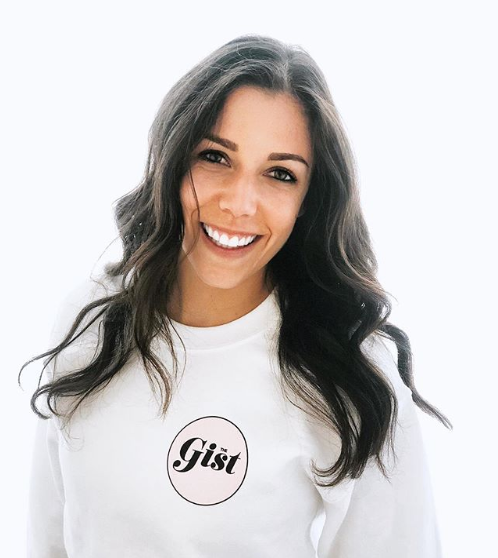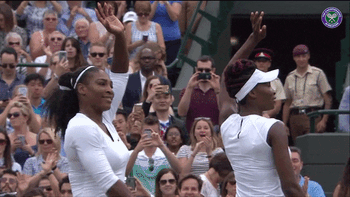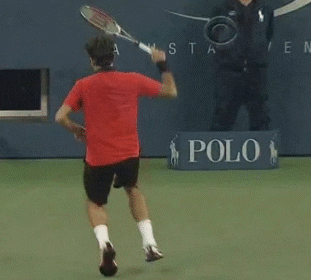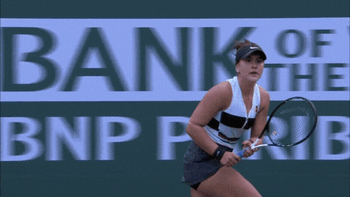Sharon Fichman

Sharon Fichman is the 87th ranked doubles tennis player in the world and a GIST athlete ambassador. After hanging up the racquet for two years from 2016-2018 after suffering some serious injuries, she decided to get back on the court and now has a new perspective and appreciation for the sport.
Prior to going back on tour in 2018, Sharon dedicated the majority of her time to coaching tennis, and feels it’s her responsibility to inspire and share her love for the sport with the next generation of female athletes. Can we get a hell yeah?
Let’s get into our interview with Sharon:
Ellen, at The GIST (TG): Let’s go back to the beginning *Hilary Duff’s Come Clean plays in the background*: how did you first get into tennis?
Sharon Fichman (SF): My family is actually a big tennis family. My dad loved the sport and played nationally in Romania where my parents are originally from. My mom was a big fan and would literally watch it at any opportunity she could. So when my parents moved to Canada, the first thing they looked up was the closest tennis court to our house.
When I was about four-years-old I found a racquet and an old tennis ball in my basement and went to play with my mom. After about 30 minutes, I figured out how to have a rally against the wall. She rushed us home after and said to my dad, “you have to see this!” Needless to say, my Dad was so excited at my game at the age of 4, we basically decided then and there that I would be a tennis player.
c/o of Sharon’s Instagram @shazzzzy
TG: Did you grow up in Romania as well?
SF: No, I was actually born in Toronto. My parents escaped the Iron Curtain, fled to Israel, then came to Canada around 1989. Pretty crazy story.
TG: Wow, that sounds wild. We’ll have to save that story for another day. Now, tennis is a very different, independent sport compared to other team sports. Can you speak to that?
SF: It is a different sport, for sure. You’re alone... except for when playing doubles, and unlike other sports where the coaches are on the sidelines, you can’t get any help from coaches. You’re out there alone for a long time and you get so physically and mentally tired. It’s also a sport that can be affected by the weather and the different types of surfaces. In basketball, for example, there’s one type of court, but in tennis there’s grass, clay, hard, indoor, outdoor…
You have to be really good at being comfortable being uncomfortable in tennis.
TG: I’ve only ever played on hardcourts and can’t even imagine how the game must change on surfaces like clay and grass. Speaking of changes...do you like singles or doubles better?
SF: Right now, I like doubles better. It’s more of like a fun, reaction game and it’s a lot easier on my Achilles...I had a 9mm Achilles tear in 2013 that wasn’t fully understood for a while. It was misdiagnosed; I didn’t have surgery, and then eventually it built up scar tissue. I just played through it for a few years but unfortunately it’s become a chronic issue at this point. I love playing singles now, but if I play too long or play too many days in a row, my Achilles really hurts.
TG: Yikes, that sounds horrible. With that injury in mind, was there a time when you didn’t love tennis?
SF: I stopped in 2016 mostly because of my ongoing Achilles injury and recurring injuries which stemmed from a bad ankle sprain. I also had a major knee surgery in summer 2014, shortly after Wimbledon. I was basically falling apart. I thought I would be healthy, would start playing again, and then a month or two later I’d re-injure myself. My rankings continued to drop and I went from main draw of Grand Slams to the qualifying draws of some of the smallest professional tournaments, which was super frustrating.
There was so much pain physically, and it took a toll on me mentally, to the point where I was no longer enjoying my time on the tennis court and the fight to grind through injuries was gone. It’s so hard to build yourself back up and build your ranking, and then see it drop...and then repeat the cycle each time I had another injury. My love for tennis just wasn’t there anymore.
I thought I needed a break and then the break just turned into, “I’m loving life right now without tennis and I’m happy to put the racquet down.” So, to be totally honest, I never really thought I would come back to it.
TG: That must have been super tough for you, but happy to hear that when you stopped playing, there were no regrets. What did you do between 2016-2018 while you weren’t playing tennis?
SF: It’s an interesting story. When I first stopped playing, I was living in Vancouver. That’s where I had been training and I absolutely loved it there. I didn’t do much for five or six months and then I started seeing someone. I’ve always had this passion for food. I’ve seen every episode of Chef’s Table…twice *laughs*. 90% of my Instagram is food or chefs. I have a restaurant bucket list of places I want to go to and eat around the world.
Anyway, I had never had a job outside of tennis, but I thought maybe I’d want to open a restaurant — I actually got the idea from Chef’s Table. I knew nothing, but I wanted to learn as much as I could so naturally, I thought I needed to learn all of this from the best restaurants in Vancouver and see if it was actually something I’d like and something I could do. I started working at a restaurant for a few months and I loved that place. I had such a good experience. It was so fun to do something completely different, in an environment where no one knows you (Editor’s note: since starting The GIST we’ve learned the tennis world in Canada is really small. It seems as though everyone knows everyone!). I really loved it, but I realized that industry wasn’t going to be my schtick. There are such crazy hours and everyone’s sleeping while you’re awake and vice versa. It was cool, glad I did it, but I prefer to see the sun.
TG: The restaurant industry is very gruelling!
SF: It is so demanding! Both physically and socially. I actually learned a lot, in social aspects, and it helped me learn how to lead, and to be cool and calm.
TG: So, how did you end up playing tennis again?
SF: So this is a bit of a complicated one. What sparked my comeback was my fiancé Dylan (Editor’s note: Dylan Moscovitch is a pairs figure skater, winning a silver medal at the 2014 Olympics).
Unfortunately, back in December 2017 Dylan had a serious but fluke accident. While he was taking a break between workouts, he gave me a call while he was relaxing on a stretching mat. While we were on the phone together, a 200 pound mirrored door next time him unhinged and fell on him.
He was knocked unconscious and suffered multiple facial lacerations, a cracked bone in his hand, multiple stitches in his right hand and was concussed for two months. What was horrible, is that I heard everything on the other end of the phone, not knowing whether or not he was dead or alive, and this was as I was about to board a three hour flight back to Toronto.
So, on the plane ride home, I literally sat there in radio silence, not knowing what news I would receive when I got off the plane. It was honestly the scariest three hours of my life. Fortunately, he obviously came out the other side, and was seriously injured. Him talking on the phone with me saved him some serious head damage as otherwise, he would have likely been meditating with his eyes closed, and wouldn’t have been able to react with his hand to help stop the majority of the impact.
Because of this, Dylan couldn’t go to the PyeongChang 2018 Winter Olympics, which was just so sad. The Olympics were always Dylan’s goal. This injury was also how he ultimately ended his career...it was a devastating time. His dream and goal was to go to two Olympic Games and he was unable to fulfill that.
So, long story short, this was the “spark” for me to make it to Tokyo...I wanted to return to tennis and build my ranking high enough to go to the Tokyo 2020 Olympic Games and have Dylan come with me so that his goal of going to two Olympic Games would somewhat come true. I know it’s not the same as competing but at least it’s something. This is why I returned to professional tennis and work as hard as I do.
TG: Wow. We had no idea that happened to Dylan that is so horrible. He must have been so devastated. It’s amazing to see how you both have found a silver lining from that injury and we think it’s so awesome seeing you back out there.
We know you’ve had a bit of a roller coaster with tennis, but what’s your favourite memory playing the sport?
SF: That’s really hard. The biggest tournament I won in singles was in Cannes, France, and that was one of my best memories. Also, my most recent time playing in Fed Cup. I actually cried at the end of the match. It was so overwhelming and incredible. I don’t know if I’m ever going to play Fed Cup again. I hope I will, but there’s a lot of depth in Canada right now. I appreciate every moment so much more at this point in my career. In the past, I took it for granted. I didn’t understand the honour as much because it was just ‘what I did’.
Now, I’m back with a different perspective. Everything is a celebration for me, because I might never have the chance to play on whatever court I’m playing on again.
I’m shooting for Tokyo 2020 Olympics and after that I don’t know what will happen, how my body is going to be. Until then, I’ll just love every second. Every moment will be the best moment.
TG: Amazing, we’ll be rooting for you! We know that young girls drop out of sport at double the rate of their male counterparts by the age of 14. How do you think we can combat this?
SF: Really, really good question.
- Having more role models and more women in sport that the younger generation can look up to is important. And also, coaches. I’m a big believer that when you’re finished as an elite athlete, it’s your responsibility to give back to the sport in some way. Somebody, or numerous people, helped you achieve what you did, and it’s your turn to do that for someone else. So I feel that it’s important to have athletes, especially female athletes, be involved and inspire the younger generation.
- Investing in coach education is super important. It’s really important for coaches to be more sensitive to different players’ needs and not be in a rigid, cookie-cutter box. The best coaches in the world are able to adapt to different types of athletes including different genders. You’ll hear that kids will stop because of a poor coaching experience or training environment, or that a person who should have been in a role model position turned them off the sport. As a coach, you are in such an influential position, and having more women and people who have the skills to grow that passion in kids is so important.
TG: Absolutely! And that’s actually a really interesting point as there’s been a lot of research about the differences in coaching styles.
Totally. It’s really sad to see the amount of athletes who leave the sport with a lot of potential.
Tennis and sport made me who I am and has had such a positive impact in my life, and that’s what I want for other people.
TG: Now to end our time together, I want to ask you some really fun, rapid fire questions. Let’s do it:
TG: What is your mantra?
SF: The biggest thing that I say before a match is, “If you want it you have to go get it”. No one is ever going to give you anything. You have to earn it and go get it yourself. If I ever have the mindset where I just hope my opponent is going to screw up then I’ve already lost. The best chance you have of being successful is to be brave.
TG: What did you want to be when you were growing up?
SF: In kindergarten, I wanted to be a fire truck haha. Then, I wanted to be a veterinarian. Then, that quickly changed to being a professional tennis player. I still love animals though!
TG: What’s your favourite TV show?
SF: Right now, I’m very sucked into this show on Netflix called Fauda. I’ve also been on a Blacklist binge. Dexter is one of my favourite shows of all time. Oh, and I really like New Girl. There were points when I had to pause episodes because I was laughing too loudly.
TG: If you could be a character from Harry Potter who would you be?
SF: Hermione, for sure. Not even a question.
TG: Who’s your role model?
SF: My partner Dylan. In tennis, I’ve always loved Martina Hingis. For a period, I was also obsessed with Ronda Rousey. I read her book and even took up boxing.
TG: What’s your guilty pleasure?
SF: Playing video games. Pokemon video games.
That's #thegistofit
Don't get The GIST’s free twice-weekly newsletter yet? Let's make it inbox official.
Enjoying this article? Want more?

Sign up for The GIST and receive the latest sports news straight to your inbox three times a week.


